WHEELS OF INDUSTRY.
Page 4
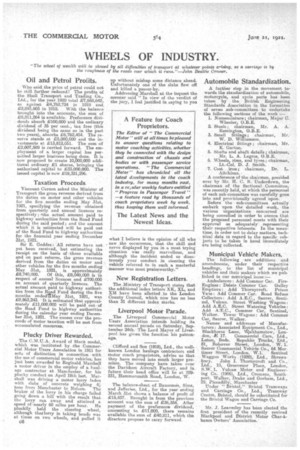
Page 5
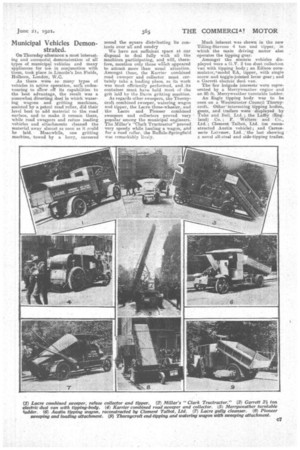
Page 6
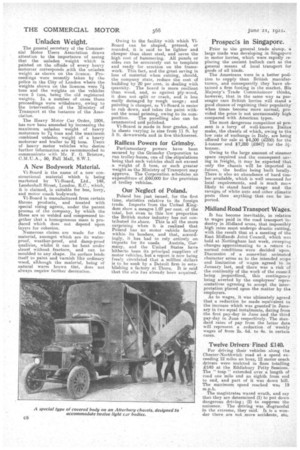
Page 7
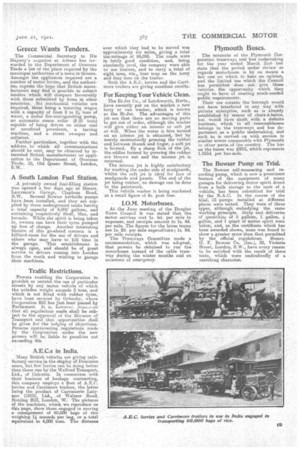
Page 8
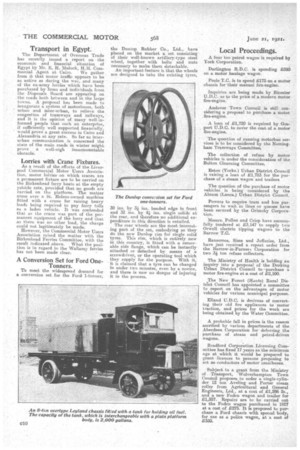
If you've noticed an error in this article please click here to report it so we can fix it.
The wheel of wealth will be slowed by all difioulties of transport at whatever points wising, as a carriage is by the roughness of the roads over which it runs."—John Beattie Craner.
Oil and Petrol Profits.
Who said the price of petrol could not be still further reduced? The profits of the Shell Transport and Trading Co., Ltd., for the year.1920 total £7,668,642, as against £4,762,724 in 1919 and £2,893,603 in 1918. With the balance brought into the accounts, the sum of £8,911,264 is available. Preference dividends absorb £100,000 and the ordinary dividend of 35 per cent., tax free (this dividend being the same as in the past two years), absorbs £6,762,454. The reserve stands at £5,000,009 and the investments at £13,812,051. The sum of £2,007,589 is carried forward. The employment of a. larger capital has permitted larger business being done. It is now proposed to create 10,000,000 additional ordinary £1 shares, bringing the authorized capital to £33,000,000. The issued capital is now £19,321,296.
Taxation Proceeds.
Viscount Curzon asked the Minister of Transport the gross revenue derived from the duties on motor and other vehicles for the five months ending May 31st, 1921, specifying the revenue obtained from quarterly and annual licences respectively ; sthe actual amount paid to highway authorities from the Road Fund during the said period; and the amount which it is estimated will be paid out of the Road Fund to highway authorities for the financial year ending December 31st, 1921.
Sir E. Geddes : All returns have not yet been received, but estimating the receipt on the basis of those available and on past returns, the gross revenue derived from the duties on motor and other vehicles for the five months ending May 31st, 1921, is approximately
£8,740,000. Of this, £8,040,000. is in respect of annuallicences and £700,000 on account of quarterly licences. The actual amount paid to highway authorities from the Rlad Fund during the five months endedq, May 31st, 1921, was £2,863,243. 'It, is estimated that approximately £11,000,000 will be paid out of the Road Fund to highway authorities during the calendar year ending December 31st, 1921. The excess over the proceeds of motor taxation will be met from accumulated resources.
Plucky Driver Rewarded.
The C.M.U.A. Award of Merit medal, which was, instituted by .the Commercial Motor Users Association in 1911 for acts of distinction in connection • with the use of commercial motor vehicles, has just been awarded to Reginald Marshall a motor driver in the employ of a haulage contractor at Manchester, for his plucky conduct on April 18th last. Marshall was driving a motor lorry laden with slabs of concrete weighing 4.1 tons from Manchester to Nelson. The brakes of the lorry in his charge failed going down a bill with the result that the lorry ran away and attained a speed of-nearly 60 miles per hour. He pluckily held the • steering wheel, although thenorry in taking bends was at times on two wheels, and pulled it C8 np without mishap some distance ahead. Unfortunately one of the slabs flew off and killed a passer-by. Addressing Marshall at, the inquest the coroner said " In view of the verdict of the jury, I feel justified in saying to you what I believe is the opinion of all who saw the occurrence, that the skill and nerve displayed by you in a most trying situation was really marvellous, and although the incident ended so disastronaly your conduct in steering the vehicle referred to in such a masterful manner was most praiseworthy."
New Registration Letters.
The Ministry of Transport states that the additional index letters XK, XL, and X31 have been allotted ta the London County Council, which now has no less than 31 different index marks.
Liverpool Motor Parade.
The Liverpool Commercial Motor Users Association intends holding its second annual parade on Saturday, September 24th. The Lord Mayor of Liverpool has given the function his patronage.
Clifford and Son (1918), Ltd., the wellknown London haulage contractors and motor coach proprietors, advise us that they have moved into much larger premises. The .company have taken over the Davidson Aircraft Factory, and in future their head office will he at 229231, Hammersmith Road, London, W.
The balance-sheet of Ransomes, Sims, and Jefferies, Ltd., for the year ending March 31st, shows a balance of profit of £15,457. Brought in from the previous account was the sum of £36,354. After payment of the preference dividend, amounting to 211,009, there remains available the sum of £40,811, which the directors propose to carry forward.
Automobile Standardization.
A further step in the movement towards the standardization of automobile, motorcycle, and cycle parts has been taken by the British Engineering Standards Association in the formation of seven sub-committees to undertake the following sections of the work :—
L Nomenclature;airman, Major C.
Wheeler, O.B.E.13 2. Steels; chairman, Mr, A. A. Remington, O.B.E. 3. Small fittings; chairman, Mr. W. D. Williamson.
4. Electrical fittings ; chairman, Mr.
E. Garton. '
5. Shafts and shaft details ; chairman, Mr. L. A. Legros, O.B.E. 6. Wheels, rims, and tyres; chairman, Lt.-Col. D. J. Smith.
7. Gast iron; chairman, Dr L. Aitchison.. _ A conference of the chairmen, presided over by Mr. H. C. B. Underdown, the chairman of the Sectional Committee, was recently held, at which the personnel of each sub-committee was carefully gone into and provisionally agreed upon. Before the sub-committees actually embark upon the detailed work, the various •organizations concerned are being consulted in order to ensure that the proposed personnel meets with their approval as adequately representing their respective interests. In the meantime, in order not, to delay matters, technical data in regard to the specific subjects to be taken in hand immediately are being collected.
Municipal Vehicle Makers.
The following are additions and amendments, under their respective headings, to • the list of municipal vehicles and their makers which we pub. lished in our municipal issue :— Ambulances : Add Commer Car. FireEngines Delete Commer Car. Gulley Emptiers: Add Thornycroft. Prison Vans: Add Commer Car. Road Refuse Collectors : Add A.E.C., Saurer, Sentinel, Vulcan. Street Washing Wagons: Add A.E.C. Street Watering Vehicles: Add A.'E.C., Commer Car, Sentinel, Walker. Tower Wagons : Add Commer Car, Saurer, Walker.
Names and addresses of Manufacturers: Associated Equipment Co., Ltd., Blackhorse Lane, Wjalthamstow, Lon don, FE 17. Commercial Cars, Ltd., Luton, Beds. Republic Trucks, Ltd., 81, Bolsover Street, London, W. 1. Saurer Commercial Vehicle Co., 64 Mor
timer -Street, London. WI. Sentinel Waggon Works (1920), Ltd., Shrewsbury. John I. Thornycroft and Co., Ltd., 10, Grosvenor Place, London, S.W. 1. Vulcan Motor and Engineering Co. (1906), Ltd., Cros,sens, Southport. Walker, Drake and Gorham, Ltd., 29, Piccadilly,. Manchester
Under " Bristol," Bristol Tramways and Carriage Co., Ltd.; Tramway Centre, Bristol, should' be substituted for the Bristol Wagon and Carriage Co. .
Mr. J. Leavesley has been elected the first president of the recently revived Blackpool and District Motor Char-a.banes Owners' Association.
Municipal Vehicles Demonstrated.
On Thursday afternoon a most interesting and successful demonstration of all types of municipal vehicles and many appliances for use in conjunction with them, took place in Lincoln's Inn Fields, Holborn, London, W.C.
As there were somany types of -vehicles in active operation, ea-cl; endeavouring to iFow of its capabilities to the best a,dvantage, the result was a somewhat diverting duel in which watering wagons and gritting machines, assisted by a petrol road roller, did their level best: to add material to the road surface, and to make it remain there, while road sweepers and refuse loading vehicles and attachments cleaned the material away almost as soon as it could be laid. Meanwhile, one gritting machine, towed by a lorry, careered
round the square distributing its contents Over all and sundry We have not sufficient space at our disposal to deal fully with all the machines participating, and will, therefore, mention only those wriich appeared to attract more than usual attention. Amongst these, the Harrier combined road sweeper and collector must certainly take a leading place, as its work was most efficiently performed, and, its container must have held most of the grit laid by the Davis gritting machine.
As regards other sweepers, the T hornyeroft combined sweeper, watering wagon and.tipper, the Leers three-wheeler, and the Lee-re and Pioneer combined sweepers and collectors proved very popular among the municipal engineers. The Millar's "Clark Tructractor" proved very speedy while hauling a Wagon, and for a road roller, the Buffalo-Springfield was remarkably lively.
Much interest was shown in the new Tilling-Stevens 4 ton end tipper, in which the main driving motor also operates the tipping gear. Amongst the electric vehicles displayed were a G.V. 2 ton dust collection van with tipping body ; an Edison aeeumulatoWmodel EA, tipper, with single screw and toggle-jointed lever gear ; and a Garrett electric dust van.
The •fire brigade interesta were represented by a Merryweather engine and an 55 ft. Merrywearher turntable ladder,
An Eagle tipping body was to be seen 'on a Westminster Council Thornycroft. Other interesting tipping bodies, gears, and trailers were displayed by Take and Bell. Ltd. ; the LafIly {,Eng. land.) Co. ; F. Walters and Co., Ltd; Clement Talbot., Ltd. (on reconstructed Austin vehicle); and Carros
Latviarer, Ltd.,' the last showing .7. novel all-steel and side-tipping trailer.
Unladen Weight.
The general secretary of the Commercial Motor Users Association draws attention to the importance of seeing that the unladen weight which is painted on the offside of every heavy motorcar corresponds evith the unladen weight is hown on the licence. Proceedings were recently taken by the police in the City of London where the weights shown on the licences were 7* tons and the weights on the vehicles were 5 tons, being the old registered weights. In a number of cases these proceedings were withdrawn, owing to the intervention of the Ministry of Transport at the instance of the Association.
The Heavy Motor Car. Order, 1904, has now hese amended by increasing the maximum unladen weight of heavy motorcars to 7e tons and the maximum combined unkiden weight of a heavy motorcar and trailer to 9,e, tons. Users of heavy motor vehicles who desire further information are recommended to communicate with Mr. F. G. Bristow, C.M.U.A., 50, Pall Mall,
A New Bodywork Material.
Vi-Board is the name of a new constructional material which is being marketed by Vi-Board, Ltd., 149, Leaelenhall Street, London, E.C. which, it is claimed, is suitable for bus, lorry, and motor coach bodywork.
Vi-Board is manufactured from certain fibrous products, and treated with special sizing agents, under the patent process of the company, by which the fibres are so welded and compressed together that a homogeneous mass is produced which does not depend upon layers for cohesion.
Numerous claims are made for the material, amongst which are its waterproof, weather-proof, and damp-proof qualities, whilst it can be bent under steard without fracture, and can be moulded to any shape. Its surface lends itself to paint and varnish like ordinary wood, although the material, being of natural warm brown tint., does not always require further decoration, Owing to the facility with which ViBoard can be shaped, pressed, or rounded, it is said to be lighter and cheaper than sheet steel, and saves the high cost of hammering. All panels or sides can be accurately cut to template and ready for erection on the framework. This fact, and the great saving in loss of material when cutting, should, the company state, reduce the cost of building by 20 per cent, in dealing with quantity. The board is more resilient than wood, and, as against ply-wood, it does not split or crack, and is less easily damaged by rough usage; and painting is cheaper, as Vi-Board is easier to rub down, and takes the paint without the usual priming, owing to its com position. The panelling also can be ornamented and polished. Vi-Board is made in four gra-des, and in sheets varying in size from 11 ft. by 5 ft. downwards and in five thicknesses.
Railless Powers for Grimsby.
Parliamentary powers have been secured by the Grimsby Corporation to run trolley-bases, one a the stipulations being thatsuch vehicles shall not exceed a weight of 5 tons, or such greater weight as the Ministry of Transport may approve. The Corporation schedules an expenditure of £60,000 for the provision of trolley vehicles.
Our Neglect of Poland.
Poland has just issued, for the first time, statietics relative to its foreign • trade. Imports from the United Kingdom show a meagre 1.07 per cent, of the total, but even to this low proportion the British motor industry has not contributed its share. This is all the more surprising when it is realized that Poland has no motor vehicle factory within its borders, and that, aticordingly, it has had to rely entirely on
imports for its needs. Austria, Germany, and the United States have hitherto been its principal suppliers of motor vehicles' but a report is now being freely circulated that a milliondollars is to be sunk by a Detroit firm in establishing a factory at Thorn. It is said that the elle has already been acquired.
Prospects in Singapore.
Prior to the general trade slump, a large trade was developing in Singapore in motor lorries, which were rapidly replacing the ancient bullock cart as the general means of local transport for goods of all kinds_
The Americans were in a better position to supply than British manufacturers, and consequently they have obtained a firm footing in the market. His Majesty's Trade Commissioner thinks, however, that in the same way as passenger cars British lorries will stand a good chance of regaining their popularity' when times become more normal, provided the price is not unreasonably high compared with American types.
The most dangerous competitor at present is a lorry.. of well-known jtatian make, the chassis of which, owing to the low rate of exchange in Italy, are being offered for sale at $4,500 (L550) for the 1-tenner and $7,200 (£847) for the 3etonner.
Owing to the large amount of steamer space required and the consequent .saying in freight, it may be expected that only the chassis will be imported in future, the bodies being built locally. There is also an abundance of hard timber available, which is well seasoned for local requirements, and is much mole likely to stand hard usage and the ravages of white ants and other climatic pests than anything that can be imported.
Midland Road Transport Wages.
It has become inevitable, in relation to wages paid in the road transport industry in Midland areas, that impossibly high rates must undergo drastic cutting, with the result that at a meeting of the East Midlands Joint Council, which was held at Nottingham last week, sweeping changes approximating to a return to normal conditions were decided upon. Discussien of a somewhat animated character arose as to the intended scope and limitation of wages agreed to in January last, and there was a risk a the continuity of the work of the council being jeopardized, this contingency being averted by the employees' representatives agreeing to accept the interpretatioe placed upon the matter by the employers.
As to wages, it was ultimately agreed that a reduction be made equivalent to the increase which was granted'in January in two equal instalments, dating from the first pay-day in June and the third pay-day in June respectively. The standard rates of pay from the latter date will represent a reduction of weekly wages of from 2s. 6d. to 4s. in certain cases.
Twelve Drivers' Fined £140.
For driving their vehicles along the Chester-Northwich road at a speed exceeding 12 miles an hour, 12 motor coach drivers were mulcted in fines totalling £140 at the Eddiebury Petty Sessions. The "trap " extended over a length of road one mile and an eighth from end to end, and part of it was down hill. The maximum speed reached was 19 m.p.h.
The magistrates waxed wrath, and say that they are determined (1) to put down dangerous driving; (2) to suppress the nuisance. The driving was disgraceful in the extreme, they said. It, is a wonder there are not more accidents, etc.
Greece Wants Tenders.
The Commercial Secretary to His Majesty's Legation at Athens has forwarded to the Department of Overseas Trade a list of the plant required by the municipal authorities of a town in Greece. Amongst the appliances required are a number of motor lorries, and the authorities express the hope that British manufacturers may find it possible to submit tenders which will dompare favourably
• with those submitted by firms in other countries. Six mechanical vehicles are required, these being a watering -Wagon with a capacity of from 2 to 4 tons of water, a motor fire-extinguishing pump, an automatic steam roller (8-10. tens) capable of being driven on either coal or unrefined petroleum, a tarring machine, and a street sweeper and collector.
Further particulars, together with the -address to which all communications should be sent, may be obtained by interested British manufacturers on application to the Department, of Overseas Trade, 55, Old Queen Street, London, S.W..
A South London Fuel Station.
.A privately owned fuel-filling station Was opened a few days ago at Messrs. Lawrence's Garage, Clapham Road, SW. Several Bowser kerbside pumps have -been installed, and they are supplied by three underground tanks having a total capacity of 6,00C gallons, and containing respectively Shell, Mex, and benzele. While the spirit is being taken in, owners can have their tyres pumped up free of charge. Another interesting feature of this go-ahead concern is a billiard-roorn for the use of drivers and others who may haveto kill time in the garage. This establishment is always open, and should be of great service to drivers coming into London from the south and wishing to garage -their machines.
Traffic Restrictions.
Powers enabling the Corporation to prohibit or restrict the uee of partieu4ar streets by any motor vehicle of which the unladen weight exceeds 2 tons, and which is not fitted with rubber tyres, have been secured by Grimsby, whose Corporation Bill has just been passed by Parliament. It Is, however, .fitipuis red that all regulations made shall, be subject to the approval of the Minister of Transport and that opportunities shall be given for the lodging of objections. Persons ermtravening regulations made by the Corporation under the new powers will be liable to penalties not exceeding 40s.
A.E.C.s in India.
Many British vehicles are giy' ingsatisfactory service in the ehaploy of Dominion users, but few lorries can be doing better than those run by the Walford Transport, Ltd., of Calcutta. In connection with their business of haulage contracting, this company employs a fleet of A.E.C. lorries and Carrimore trailers, the latter being the product of Carrosserit Latyruler (1915), Ltd., of Widmer Road, Notting Ha London, W.. -The pictures of the machines, which we reproduce on this page, Show them engaged in moving a consignment of 60,000 bags of rice weighing I maunds per bag, or a total equivalent to 4,000 tons. The distance over which they had to be moved was approximately six miles, giving is total ton-mileage of 24,000. The roads were in fairly good condition, and, being absolutely level, the company were able to use trailers, and to carry a total of eight tons, viz., four tons on the lorry and four tons on the trailer.
Both the A.E.C. lorries and the Carrimore trailers are giving excellent results.
For Keeping Your Vehicle Clean.
The Bi-Jet Co., of Letchworth,•klerts., have recently put on the market a new lorry or van washer, which is known as the Bi-Jet. The advantages of this jet are that there are no moving parts to get, out of order, although the washer will give either .an intense or soft jet at will. When the water is first, turned on an intense jet is obtained, but by merely momentarily pressing the rubber end between thumb and finger, a soft jet is formed. By a sharp flick of the jet, the eddies formed by pressing the rubber are thrown out and the intense jet is returned.
The intense jet is highly satisfactory for washing the under-side of mudguards, whilst the soft jet is ideal for face of mudguards and panels. The end of the jet being rubber, no damage can be done to the paintwork.
This vehicle washer is being marketed at a retail figure of 68. post free.
I.O.M. Motorbuses.
At the June meeting of the Douglas Town Council it was stated that the motor services cost ls. 6d. per mile in expenses, and receipts amount to is. 4d. per mile. The figures for the horse trams are Is. al. per mile expenditure; is. 9d. per mile receipts.
The Tramways Committee made a recommendation, which was adopted, that powers he obtained to run the motorbuses, instead of the cable tramway during the winter months and on occasions of emergency.
Plymouth Buses.
The accounts of the Plymouth Corporation tramways and bits undertaking for the year ended March 31st last state that the period under review as regards motorbuses is by no means a fair one on which to base an opinion, and the limited use which the Council has permitted does not give these vehicles the opportunity which they ought to have of meeting much-needed public requirements..
Their use outside the borough Would not have interfered in any way with private enterprise, such as is already established by means of chare-b-bance, but would have dealt with a definite business, which in all reasonableness belongs to the tramways and bus department as a public undertaking, and such Its is carried on with success in .similar towns comparable with Plymouth in other parts of the country. The loss on the buses was £815, which represents 1.255d. per bus-Mile.
The Bowser Pump on Trial.
The Bowser self-measuring and recording pump, which is now a prominent feature of the equipment of many garagos for delivering motor spirit direct from a bulk storage to the tank of a vehicle, has been submitted for trir.1 by the R.A.C. In the course of the trial, 12 pumps installed at different places were tested. They were of three types, although embodying the same working principle. Sixty test deliveries of quantities of 5 gallons, 1 gallon, gallon, and 1 quart of motor spirit were taken, and, as the certificate which has been awarded sliews, none was found to show a greater error than that permitted by the official regulations. Messrs. G. F. Bowser Co. (Inc.), 32, Victoria Street, London, S.W., have every reason to be satisfied with the result of these tests, which were undoubtedly of a searching character.
Transport in Egypt.
The Department of Overseas Trade has recently issued a report on the economic and financial situation of Egypt by Mr. E. H. Mulock, H.M. Com
mercial Agent at Cairo. We gather from it that motor traffic appears to be as active as during the war, and many of the ex-army lorries which have been purchased by firms and individuals from the Disposals Board are appearing on the roads both between and in the large towns. A proposal has been made to inangurate a system of motorbuses, both urban arid inter-urban, to relieve the congestion of tramways and railways, and it is the opinion of many well-informed people that such ari enterprise, if sufficiently well supported financially, would prove a great success in Cairo and Alexandria at. any rate. So far as interurban communication is concerned the state of the main roads in winter might. prove a well-nigh insurmountable obstacle.
Lorries with Crane Fixtures.
As a result of the efforts of the Liverpool Commercial Motor Users Association, motor lorries • on which cranes are a permanent fixture are to be carried on the Birkenhead ferry boats at the empty vehicle rate, provided that no goods are carried, on the platform. The matter arose over a St. Helens-owned machine fitted' with a crane for raising heavy loads being required to pay ferry tolls as a laden vehicle. It was contended that as the crane was part of the permanent. equipment of the lorry and that. as there was DO other load, the charge could not legitimately be made. However, the Commercial Motor Users Association raised the matter with the Birkenhead Ferries Committee, with the result indicated above. What. the position is in regard to the Wallasey ferries has not been made clear.
A Conversion Set for Ford OneTonners.
To meet the widespread demand for a conversion set for the Ford 1-tonner, the Dunlop Rubber Co., Ltd., have placed on the market a set consisting of their well-known artillery-type steel wheel, together with bolts and nuts necessary to make them detachable. An important feature is that the wheels are designed to take the existing tyres,
30 ins. by 3i ins, beaded edge in front and 32 ins. by /14 ins, single solids" at the rear, and therefore no additional expenditure in this direction is entailed.
The rear wheels are the most. interesting part of the set, embodying as they do the new Dunlop rim for single solid tyres. This rim, which is entirely new in this country, is fitted with a removable side flange, Which can be instantly attached or detached by means of a screwdriver, or the operating tool which they supply for the purpose. With it, it is claimed that a tyre can be changed in under two minutes' even by a novice, and there ia now no danger of injuring it in the process. • Local Proceedings.
A four ton petrol wagon is required by York Corporation.
Darlington R.D.C. is spending £350 on a motor haulage wagon.
Poole T.C. is to spend £175 on a motor chassis for 'their manual fire-engine.
Inquiries are being made by Bicester U.D.C. as to the price of a modern motor fire-engine.
Andover Town Council is still considering a proposal to purchase a motor .fire-engine.
A loan of £1,720 is required by Gosport U.D.C. to cover the cost, of a motor fire-engine.
'The question of running motorbus services is to be considered by the Nottingham Tramways Committee.
The collection of refuse by motor vehicles is under the consideration of the Bolton Cleansing Committee.
Eton (Yorks.) Urban District Council is raising a loan of 21,783 for the purchase of a steam wagon and trailers The question of the purchase of motor vehicles is being considered by the Abram (Lancs.) Urban District Council.
Powers to require tram and bus passengers to wait in lines or queues have been secured by the Grimsby Corporation.
Messrs. Pollen and Crisp have successfully tendered at £3,147 to supply two Orwell electric tipping wagons to the Barrow T.C.
Ransomes, Sims and Jefferies, Ltd., have just. received a repeat order from the Barrow-in-Fumes i Corporation for two 3i ton refuse collectors.
The Ministry of Health is holding an inquiry into a proposal of the Dorking Urban District Council to 'purchase a motor fire-engine at a cost of 22,100.
The New Forest (Hants) Rural District Council has appointed a committee to report on the advantages of motor vehicles for various municipal purposes.
Elland U.D.C. is desirous of converting their old fire appliances to motor traction, and prices for the work are being obtained by the Water Committee.
A probable fall in prices is the reason ascribed by various departments of the Aberdeen Corporation for deferring the purchase of steam and petrol-driven wagons.
Bradford Corporation Licensing Committee has fixed 17 years as the minimum age at which it would be prepared to grant • licences to persons proposing to act as conductors of motor omnibuses.
Subject to a grant from the Ministry of Transport, Wolverhampton Town Council proposes, to order a single-cylinder 12 ton Aveling and Porter steam roller from Agricultural and General Engineers, Ltd., at a cost of £1,206 2s., and a new Foden wagon and trailer for £1„357. Repairs are to be carried out to the Foden wagon purchased in 1917 at a cost of £275. It is proposed to purchase a Ford chassis with special body, for use as a police wagon, at a cost of £350.






































